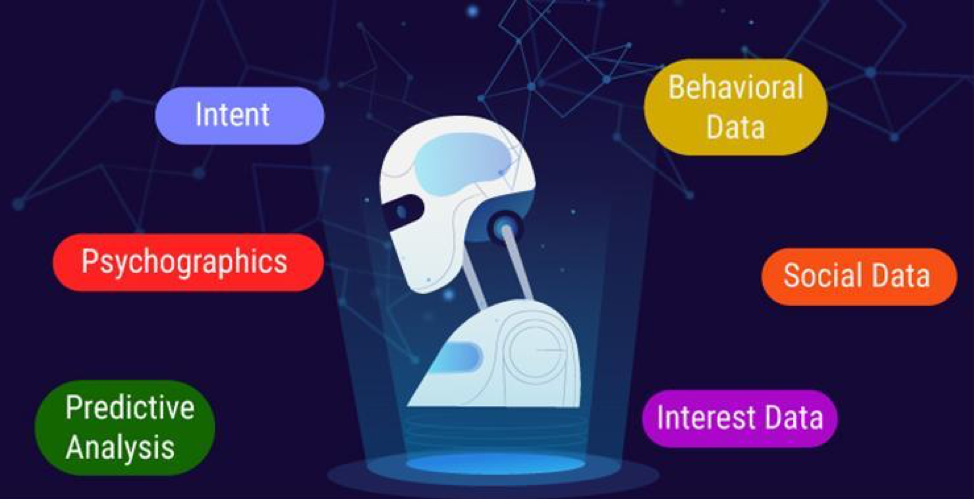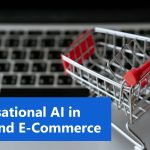Apps that support, enable and continually learn from user interactions to become even more relevant and valuable.
By 2020, world’s data doubled every two months. The rapid rise of the Internet of Things (IoT), big data and machine learning are radically redefining apps as we know them. Unlike their predecessors Intelligent Apps are – intelligent, contextual and proactive.
With these smart experiences already proliferating the consumer space, enterprises face a sense of urgency to catch up and start generating value from these technologies before their competitors. Organizations that delay adoption and fail to integrate the IoT and algorithmic business are at a competitive disadvantage—or at a risk of displacement by digital disruption in the next five years.
Table of Contents
What is intelligent about “Intelligent Apps”?

The next generation of mobile applications are the result of multiple worlds coming together. When app development meets artificial intelligence, the Internet of Things and big data analytics, intelligent apps are the outcome.
Put simply, these apps continuously learn from user interactions as well as other data sources to become even more relevant and useful. Intelligent Apps use historical, real-time data from user interactions and other sources to make predictions and suggestions, while delivering personalized and adaptive user experiences.
Building an Intelligent App Ecosystem
Effective artificial intelligence applications accurately understand user intent. They can learn why a user chooses to click a certain feature or buy premium subscriptions. Data analysis and machine learning are cornerstones of the intelligent app ecosystem. By interfacing AI with REST APIs, app developers can use machine-learning algorithms for services like mapping and location.
REST stands for Representational State Transfer and is, in fact, an architectural style for exposing a program using existing protocols, typically HTTP, or different web services and interfaces.
The resulting app, powered by AI, can predict user intent, gather behavioural interest and social data, and even create graphics from it.

Intelligent apps can soon act as building blocks for high-level, human-to-machine, interactions. A connected AI ecosystem helps in increasing machine, computer, and program efficiency, and enable an app to predict user behaviour to create personalized user experiences.
These apps can suggest actions, ask questions, and solve challenges to learn more about user behaviour.
An intelligent app can successfully –
- Study the user context and predict user intent
- Make informed decisions for the users
- Provide information to the user based on their previous searches
- Auto-reply to emails and messages
- Automate tasks using pre-programmed commands
- Predict users’ communication choices and tone
AI goes beyond self-learning algorithms, machine learning, and deep learning. AI brings together big data, data mining, and neural networks into its programming. AI has in fact disrupted the landscape as developers now focus more on personalization and innovation.
The typical features of smart apps
 Chatbots, virtual assistants and recommendation engines on e-commerce sites are just a few examples of intelligent applications. While it is difficult to construct a catch-all definition of smart apps, they have a number of typical features:
Chatbots, virtual assistants and recommendation engines on e-commerce sites are just a few examples of intelligent applications. While it is difficult to construct a catch-all definition of smart apps, they have a number of typical features:
- Data-driven – Intelligent apps combine and process multiple sources of data – such as IoT sensors, user interactions and beacons – to turn an enormous quantity of numbers into valuable insights.
- Contextual and Relevant – Intelligent apps make smarter use of a device’s features to proactively deliver highly relevant information and suggestions. Users no longer have to go to their apps. Instead, the apps come to them.
- Continuously Adapting – Due to machine learning, intelligent apps continuously adapt to improve their output.
- Action-oriented – By anticipating user behaviours with predictive analytics, smart applications deliver actionable and personalized suggestions.
- Omnichannel – Today, Progressive Web Applications (PWAs) are increasingly blurring the lines between native apps and mobile web applications.
Although the adoption of smart applications will move faster in B2C, their added value is equally high in B2B.
Integrating Artificial Intelligence into Business Applications

AI can improve efficiencies in many industries. As consumer demands continue to grow, businesses have to deliver personalized experiences to stand out from the rest. To achieve this, businesses are turning to AI.
Over 60% of business said they use AI to find opportunities in data. AI apps can revamp outdated practices in supply chain management, e-commerce, and logistics. For example, machine-learning, when applied within supply-chain management, helps forecast demand and supply and, thus, transforms the optimization of supply chain decision-making. Let’s look at its excellence in other sectors and industries.
- In a production environment, a smart app could use beacon signals to alert people when they enter a zone where safety gear is required.
- Based on Wi-Fi and smartphone data, an app could determine when to turn off the lights in an office building. Apps could also replace current systems for manual time registration.
- For salespeople, an intelligent app could evaluate and prioritize leads by predicting which opportunities are most likely to close.
How can intelligence be infused into an app?
The answer to this question has many layers. The tremendous growth in data science and its underlying infrastructure has allowed machines to process, segregate and analyse huge volumes of data in a short span of time. The machines can then glean meaningful patterns and insights from the very same data.
One such example is predicting user behaviour patterns – predicting what movies or food or brand of clothing the user might be interested in, what songs they might want to listen to at different times of the day and so on. Most businesses have already implemented this and are perfecting these tasks on a day-to-day basis.
Why CIOs are investing in Intelligent Apps?

‘Smart apps’ can expedite business transformation and deliver unprecedented new insights, while unleashing next level productivity. Lets explore why CIOs are investing in intelligent apps.
1. Personalized and Contextually Aware Notifications
Apps that can deliver personalized, and context aware notifications have the ability to significantly streamline the most important information that workers’ need, when and where they need it.
For example, a salespersons’ workflow – when going to meet with a potential client- entails pulling up their CRM record, finding the address and navigating to the location. However, instead of thumbing through multiple steps to access the intended data, a context aware app is already aware of the salesperson’s activity. Based on their calendar and traffic route, the app can surface the relevant data via a notification that allows the user to click and go, streamlining their process and increasing efficiencies.
This not only helps save time, but also helps employees and systems make quicker decisions
2. Automation through Conversation
Chatbots and conversational interfaces are used increasingly in our daily lives. Bots help automate complex problems and can pull information in an instant through natural language processing (NLP). Significant gains in productivity, increased response time, improved data accuracy and decision making are all real outcomes of chatbot adoption.
Chatbots can help automate help desk resources by handling routine requests with immediate responses, and then notify the correct person to handle further via push notifications or alerts. Such automation can also be leveraged for conversational workflows, which apps can inherently surface the relevant data needed without having to search to find it.
3. It’s All About the ‘Right Time Moments’
This ability to deliver information to the right user(s) at the right time(s) on their desired device may have always been the bespoken promise of enterprise mobility, but modern intelligent apps make such moments the norm and not the exception. What’s great about Intelligent apps is that they continuously get smarter, meaning their recognition of when and what constitutes a ‘right time’ moment will continually improve. Such moments can lead to unprecedented improvements in productivity, customer service and employee turnover, equating to cost saving and revenue gains over time.
A few Intelligent Apps that revolutionize our daily lives
- HANA – SAP developed this AI App to help businesses turn the database into a practical and more useful tool of intelligence. The solution runs on the cloud platform and works by replicating and ingesting structured draw data such as customer information and sales transaction. This information can be obtained from relational databases and apps among other sources. The powerful solution is also able to access information collated from various business access points like financial transactions and desktop or mobile computers. Businesses that want to tap into HANA can have the platform installed on-premise via the cloud or company servers.
- Apptus – The Apptus eSales App is a sales enablement platform. The solution enhances applications by giving companies crucial recommendations on various actions, including those designed to boost sales. The app prides in bridging the gap between the varied customer intuition to buy and companies need to grow revenue through sales. To enhance its capabilities, the App combines machine learning along with big data to find products that appeal to potential buyers looking for recommendations or searching online for particular products.
- DOMO – DOMO is another powerful AI solution for business dashboards. Developed by a fast-growing business management software firm, the cloud-based dashboard scales reasonably with different company sizes and is highly ideal for midsize to large enterprises. A number of native software connectors have given Domo Inc. permission to collect data from various third-party Apps. Businesses can then use the information to gain critical insights. In its latest release, Domo has added several features borrowed from AI, predictive analytics and machine learning. With the additions, the App will be able to send notifications about new data patterns and anomalies.
- Avanade – This AI Business Insights (BI) solution was developed courtesy of a collaboration between Accenture and the Washington state-based, Microsoft. It works by leveraging data analytics insights, predictive analytics, and the popular Cortana Intelligence Suite. Avanade also cleverly taps into customer and policy information to drive growth. It does this by analysing policyholder behaviours and trends. Several companies, including Pacify Specialty have adopted the solution to help them build an analytics solution that offers better perspective of business insights.
- AppZen – AppZen is set to redefine how finance teams work, by using AI to audit all expense reports and invoices ahead of payment. Aside from validating prices, it promises to provide intelligent insights which help teams reduce spend, comply with policy and optimize processes. Integrating with all major back-office systems, it offers businesses the power of a super team of auditors without any disruption to their existing processes.
- Legal Robot – Legal Robot helps to make stodgy business contracts understandable. Using machine learning, it compares thousands of legal documents to construct abstract representations of the language in a legal document. Aside from translating inaccessible legalese into plain English, it can also apply this knowledge to identify potential problems with a legal document, including its legal style, definitions and risky language.
- Microsoft PowerApps – PowerApps is part of Office 365 and allows power users to create business applications in as little as a couple of hours. PowerApps is, fundamentally, a development platform for mobile and web apps. It allows “citizen developers” to reach capabilities that were once only reserved for high-end development tools. What’s more, PowerApps is generally quite easy to learn. The beauty of building an app on Microsoft PowerApp is that you can also make sure it is completely wrapped around your organisation’s unique user needs and the way your employees work.
Summing up
Intelligent Apps are touching all areas of our lives – Media, Technology, Healthcare, Finance, Lifestyle, etc., by implementing tasks with the highest accuracy. While these are just some of the use cases, it’s clear that the next generation of apps have an exciting potential to offer to companies who are willing to start exploring its benefits. Before getting into developing intelligent apps, companies should start by identifying which business processes need streamlining. Ready to start looking for your company’s smart app?
















